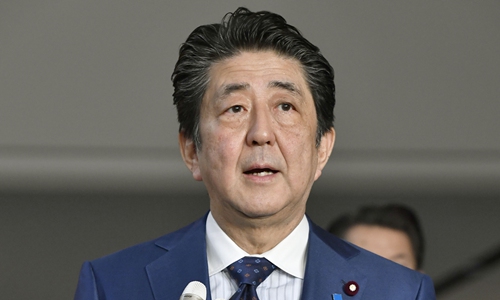HOME >> OPINION
Though Japan’s longest PM, Abe lacks feats
By Chen Yang Source:Global Times Published: 2019/11/19 21:33:41

Japanese Prime Minister Shinzo Abe Photo: IC
After Wednesday, Japanese Prime Minister Shinzo Abe will become the longest serving prime minister in Japanese history, breaking the record of 2,886 days set by former prime minister Taro Katsura.
As protectionism is on the rise worldwide, the long tenure of the Abe administration means stable implementation of policies. The stable political condition of Japan, the world's third-largest economy, is also of great significance to safeguarding the world's multilateral free trade system.
The stability of the Abe administration is not a coincidence. His term has been boosted by Japan's economic recovery. By analyzing the relationship between the length of Japanese prime ministers' tenure and the country's economy after WWII, it is easy to conclude that the length of the prime minister's term is proportional to the momentum gained by the economy.
For example, during the administration of Eisaku Sato from 1964 to 1972 - the third longest serving Japanese prime minister - the average annual growth rate of the economy was about 10 percent. During the administration of Junichiro Koizumi from 2001 to 2006, the sixth longest serving Japanese prime minister, the average annual growth rate was about 1.4 percent. In contrast, during the 10 years of the "lost decade" of the Japanese economy from 1991 to 2001, Japan changed nine prime ministers.
In spite of Abenomics being still somewhat controversial in Japan, the continuous improvement of Japan's economic environment is an indisputable fact.
According to the Japanese government's monthly economic report released in January, the economy kept growing for 74 months from December 2012 to January. Besides, the long-term depreciation of the yen has not only driven Japan's exports, but also attracted more foreign tourists to the country, stimulating the Japanese economy.
An increasingly stronger Japan-US alliance has also contributed to the longevity of the Abe administration. Japan-US alliance has been the axis of postwar Japanese diplomacy, and the state of the alliance is somewhat related to the duration of the prime minister's tenure.
For example, Yasuhiro Nakasone had close relations with then US president Ronald Reagan, which people called the "Ron-Yasu" friendship, which helped take Japan-US relations to a new level. In contrast, the Yukio Hatoyama administration ended quickly because it had disputes with Washington over the relocation of US military bases in Japan.
Since Abe was reelected prime minister at the end of 2012, he has dealt with the Barack Obama and Donald Trump administrations. During the Obama administration, Abe proactively cooperated with the US rebalance to Asia-Pacific strategy and participated in the Trans-Pacific Partnership, trying to fix the alliance damaged during the rule of Japan's Democratic Party. During the Trump administration, Abe has tried to strengthen the alliance by developing personal friendship with Trump to set off the damage due to worsening trade deficits.
Indeed, Abe becoming the longest-serving prime minister in Japanese history deserves praise. But an administration has to be judged not only by the length of its tenure, but by what it actually achieves. In postwar Japanese history, there is a tradition that every cabinet should have a political achievement to its credit. For instance, the Hayato Ikeda administration's Income Doubling Plan of 1960, the return of Okinawa in 1972 from the US to Japanese control during the Eisaku Sato administration and the normalization of China-Japan relations in 1972 during the Kakuei Tanaka administration.
However, the Abe administration has not made impressive achievements in its long tenure. Constitutional revision faces difficulties with the Japanese against amending Japan's pacifist Constitution. Abenomics has only made some Japanese rich and could not get rid of deflation.
As for diplomacy, normalizing Japan-North Korea relations, agreeing a peace treaty with Russia and resolving territorial issues would be considered major diplomatic achievements for Abe. However, current Japan-North Korea relations are still far from being warm although Abe has put in efforts to improve them. Besides, even though Japan and Russia intend to sign a peace treaty, the two governments still lack political trust because of the US.
Abe's premiership ends in 2021. As the aforesaid internal and diplomatic issues cannot be resolved in a short time, the future two years seem especially important for Abe. Political achievements are more important than the tag of the longest-serving prime minister.
The author is a media professional and an observer of Japan issues. opinion@globaltimes.com.cn
RELATED ARTICLES:
Posted in: ASIAN REVIEW